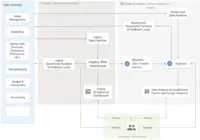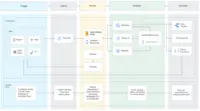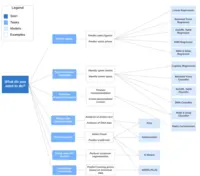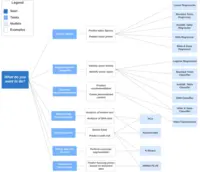Overview
What is Google BigQuery?
Google's BigQuery is part of the Google Cloud Platform, a database-as-a-service (DBaaS) supporting the querying and rapid analysis of enterprise data.
Data Management with Google BigQuery
An overview of Google BigQuery
Data analytics experience on Google BigQuery
Great tool for Data Warehousing & Storage!
Google BigQuery Review
BigQuery helps us remain a data driven team
A good big-data powerhouse for analytics and more
My Experience with Google BigQuery.
Big Query, very powerful in the right context.
Google BigQuery - Experience
Data Warehouse That Gives Your Organization wings!
Average product and does what it says it can
Google BigQuery review
A data powerhouse to manage complex datasets in a jiffy
Awards
Products that are considered exceptional by their customers based on a variety of criteria win TrustRadius awards. Learn more about the types of TrustRadius awards to make the best purchase decision. More about TrustRadius Awards
Popular Features
- Database scalability (53)8.888%
- Database security provisions (46)8.787%
- Automated backups (24)8.585%
- Monitoring and metrics (48)8.484%
Reviewer Pros & Cons
Pricing
Standard edition
$0.04 / slot hour
Enterprise edition
$0.06 / slot hour
Enterprise Plus edition
$0.10 / slot hour
Entry-level set up fee?
- No setup fee
Offerings
- Free Trial
- Free/Freemium Version
- Premium Consulting/Integration Services
Starting price (does not include set up fee)
- $6.25 per TiB (after the 1st 1 TiB per month, which is free)
Product Demos
Lesson#6 - BigQuery for beginners| Analyzing data in google bigquery | Step by step tutorial (2020)
How to get started with BigQuery
BigQuery, IPython, Pandas and R for data science, starring Pearson
Google BigQuery Demo
Google BigQuery introduction by Jordan Tigani
Features
Database-as-a-Service
Database as a Service (DBaaS) software, sometimes referred to as cloud database software, is the delivery of database services ocer the Internet as a service
- 8.1Automatic software patching(17) Ratings
Patches applied to database automatically
- 8.8Database scalability(53) Ratings
Ease of scaling compute or memory resources and storage up or down
- 8.5Automated backups(24) Ratings
Automated backup enabling point-in-time data recovery
- 8.7Database security provisions(46) Ratings
Provision for database encryption, network isolation, and identity access management
- 8.4Monitoring and metrics(48) Ratings
Built-in monitoring of multiple operational metrics
- 8.1Automatic host deployment(13) Ratings
Compute instance replacement in the event of hardware failure
Product Details
- About
- Competitors
- Tech Details
- FAQs
What is Google BigQuery?
BigQuery is a fully managed, AI-ready data analytics platform that helps you maximize value from your data and is designed to be multi-engine, multi-format, and multi-cloud.
Store 10 GiB of data and run up to 1 TiB of queries for free per month.
Gemini in BigQuery for an AI-powered assistive experience
BigQuery provides a single, unified workspace that includes a SQL, a notebook and a NL-based canvas interface for data practitioners of various coding skills to simplify analytics workflows from data ingestion and preparation to data exploration and visualization to ML model creation and use. Gemini in BigQuery provides AI-powered assistive and collaboration features including code assist, visual data preparation, and intelligent recommendations that help enhance productivity and optimize costs.
Bring multiple engines to a single copy of data
Serverless Apache Spark is available directly in BigQuery. BigQuery Studio lets users write and execute Spark without exporting data or managing infrastructure. BigQuery metastore provides shared runtime metadata for SQL and open source engines for a unified set of security and governance controls across all engines and storage types. By bringing multiple engines, including SQL, Spark and Python, to a single copy of data and metadata, the solution breaks down data silos.
Built-in machine learning
BigQuery ML provides built-in capabilities to create and run ML models for BigQuery data. It offers a broad range of models for predictions, and access to the latest Gemini models to derive insights from all data types and unlock generative AI tasks such as text summarization, text generation, multimodal embeddings, and vector search. It increases the model development speed by directly applying ML to data and eliminating the need to move data from BigQuery.
Built-in data governance
Data governance is built into BigQuery, including full integration of Dataplex capabilities such as a unified metadata catalog, data quality, lineage, and profiling. Customers can use rich AI-driven metadata search and discovery capabilities for assets including dataset schemas, notebooks and reports, public and commercial dataset listings, and more. BigQuery users can also use governance rules to manage policies on BigQuery object tables.
Google BigQuery Features
Database-as-a-Service Features
- Supported: Database scalability
- Supported: Database security provisions
- Supported: Monitoring and metrics
Google BigQuery Screenshots
Google BigQuery Video
Google BigQuery Competitors
Google BigQuery Technical Details
| Deployment Types | Software as a Service (SaaS), Cloud, or Web-Based |
|---|---|
| Operating Systems | Unspecified |
| Mobile Application | No |
Frequently Asked Questions
Comparisons
Compare with
Reviews and Ratings
(249)Attribute Ratings
Reviews
(1-25 of 31)Google BigQuery is great for integrations!
- Data Query
- Active Database Management
- Integration with other Programs
- Navigation of side panel can be tedious at times
- Ability to deploy queries more easily across multiple datasets
- More step-by-step guides (the ones they have are great)
An overview of Google BigQuery
- First and foremost - Google BigQuery is great at quickly analyzing large amounts of data, which helps us understand things like customer behavior or product performance without waiting for a long time.
- It is very easy to use. Anyone in our team can easily ask questions about our data using simple language, like asking ChatGPT a question. This means everyone can find important information from our data without needing to be a data expert.
- It plays nicely with other tools we use, so we can seamlessly connect it with things like Google Cloud Storage for storing data or Data Studio for creating visual reports. This makes our work smoother and helps us collaborate better across different tasks.
- Please expand the availability of documentation, tutorials, and community forums to provide developers with comprehensive support and guidance on using Google BigQuery effectively for their projects.
- If possible, simplify the pricing model and provide clearer cost breakdowns to help users understand and plan for expenses when using Google BigQuery. Also, some cost reduction is welcome.
- It still misses the process of importing data into Google BigQuery. Probably, by improving compatibility with different data formats and sources and reducing the complexity of data ingestion workflows, it can be made to work.
However, it may not be the best fit for organizations dealing with small datasets because of the higher costs. And also, it might not be the best fit for highly complex data transformations, where simpler or more specialized solutions could be more appropriate.
Data analytics experience on Google BigQuery
- Provide real time data for analysis and monitoring purpose.
- SQL based queries makes it user friendly.
- It can handle large amount of data.
- sometime faced performance issues in query execution
- training material is not easily available
- Continuous maintenance required
Sometime Small volume of data require same effort of writing query which is little bit hectic for users.
Great tool for Data Warehousing & Storage!
- Good place to store historical data.
- It has free connectors to other Google platforms like Looker, which makes it easy to use as a data source.
- User interface is easy to navigate.
- Hard to find data if you don't know where everything is hosted.
- If you have to upload excel files it takes so long.
- If you aren't a technical users you likely won't know how to use BigQuery effectively.
BigQuery helps us remain a data driven team
- Mining large data sets
- Determining trends
- Strategize product depending on the trends
- It can be slow at times
- Could be difficult for a first time user
My Experience with Google BigQuery.
- Scale automatically to handle datasets of any size.
- BigQuery can perform extremely fast SQL queries across vast datasets.
- Pay-as-you-go model, BigQuery allows users to pay only for the data processed and stored.
- It is challenging to predict costs due to BigQuery's pay-per-query pricing model. User-friendly cost estimation tools, along with improved budget alerting features, could help users better manage and predict expenses.
- The BigQuery interface is less intuitive. A more user-friendly interface, enhanced documentation, and built-in tutorial systems could make BigQuery more accessible to a broader audience.
Big Query, very powerful in the right context.
- Good python package.
- SQL knowledge goes a long way though some peculiars are confusing.
- Make it more simple to administrate login from python.
- Difficult to estimate cost prior.
Data Warehouse That Gives Your Organization wings!
- Data warehouse
- Complex queries
- Server-less
- Real-time queries
- The speed at which the queries run
- Suggesting insights from within the data automatically
- Making it simpler for a non-tech person to access it
- Unlocking real-time user data
- Boosting data-processing power
- Performing more extensive business analytics
Not so good for:
- Transactional data
- Updating data
Google BigQuery review
- Syncing with Google products, e.g. Looker studio. Easy to create dashboards when putting a Google BigQuery data table as data source.
- Scalability. It allows many opportunities across the business.
- It's easy enough to write SQL statements front-end to explore the data tables.
- Interface difficult to understand for new users.
- Not much support provided.
- Having to wait roughly 24 hours before getting the data from Google Analytics into Google BigQuery. A shorter time would be great.
A data powerhouse to manage complex datasets in a jiffy
- Its serverless architecture and underlying Dremel technology are incredibly fast even on complex datasets. I can get answers to my questions almost instantly, without waiting hours for traditional data warehouses to churn through the data.
- Previously, our data was scattered across various databases and spreadsheets and getting a holistic view was pretty difficult. Google BigQuery acts as a central repository and consolidates everything in one place to join data sets and find hidden patterns.
- Running reports on our old systems used to take forever. Google BigQuery's crazy fast query speed lets us get insights from massive datasets in seconds.
- Google BigQuery's built-in visualization tools are limited compared to dedicated BI tools. Expanding the options and allowing for more customization would help explore and present data insights.
- Currently, it's hard to track where the data comes from and how it changes as it moves through the pipeline because it lacks data lineage capabilities. It's tough to ensure data quality assurance and regulatory compliance.
- The current access control options are somewhat limited. Granular control over specific datasets or tables within a project would help manage access in collaborative environments.
- Data Warehousing
- Data Analytics
- Machine Learning
- The UI and the whole Google BigQuery studio is full of clutter.
- It's very hard to find error logs related to your application if the backend is Google BigQuery
- It's hard to share specific tables with someone which has a different place than Cloud IAM.
Google BigQuery is not well suited if your Database is very small. As the Google BigQuery architecture take similar time in small database which is counter intuitive.
Data Analysis on Steroids with Google Big Query
- Big Query is fast and based on the cloud you can run your query on a huge dataset. Huge means data in TB's. This also reduces the company cost to build that kind of infrastructure to store data.
- Not specific to Google Analytics but you can import data from different sources for analysis purpose and use the power of the cloud to run the query.
- Not much time to learn - You don't need any special skills, just SQL and you can use Big Query for your use. Learning SQL is not a big task you can learn it in a week.
- Big Query refrence schema and different sample query are available to practice on queries.
- Google also provide sample dataset to use then purchase Big Query.
- Though it is SQL some syntax are different but they are getting used to after you use for some time.
- The legacy SQL is in beta state but can be used and you can run the query with simple SQL.
- More documentation is needed for using User-defined functions in Big Query.
- For analyzing a small dataset you don't need Big Query you can use normal MySQL on your own premises. Analyzing on Un-structured data is not possible with Big Query.
- Allows for fast and efficient analysis of huge amounts of data
- Allows for running interactive and batch queries
- Allows for creation of dashboards and reports
- Allows for real-time analytics on a server-less architecture
- Streaming data can be expensive
- Does not support advanced Machine Learning and Deep Learning techniques
- Number of partitions in tables are limited to 4,000
One stop solution for data management and fast querying
- Automatically optimises queries to fetch data quickly
- Allows efficient management of data across multiple databases
- The editor and query builder have a very intuitive interface that makes it easy to build new queries fast
- Not able to search specific column fields using search functionality
- Uploading database using excel is time consuming and error prone
- The error message thrown while querying can be more customisable to correct the errors
Best scaled engineering/analytical data service available
- Standard SQL
- Scale
- RDBMS-like features
- Python library support
- Reliability
- Python library authentication simplification
- multi-transaction ACID compliance
Quit Worrying, Start Using BigQuery
- Transparency in terms of cost
- Utilisation of the data warehouse and suggestion on the sizes
- Easy to use and integration with other components
- UiUX features can be improved further in terms of navigating from one folder to another
- Google BigQuery is column based, therefore it has high speed and easily accessible.
- As I work with inventory related data, it gives me real time updates which helps to resolve many blocks which could cause problems if delayed.
- Being serverless, it is easy to handle large size data.
- Google BigQuery charge according to the quality of the code. So if it is long and lengthy and not the most efficient it can be costly.
- The UI/UX is little difficult to use at the beginning on a small screen because of the layout.
BigQuery = Big Win
- Performance at scale.
- Console interface is a little clunky.
Easily Managed Data Warehouse Delivered At Scale
- Highly scalable data warehouse
- Easily integrated into analytics tools like Data Studio
- Easy to use with SQL support
- Can be pricey. There are ways to lower costs but they aren't always straightforward.
Big Advantages to BigQuery
- The computing used by BigQuery is dynamically distributed across compute resources so that you do not have to manage compute clusters.
- Big Query connects easily with Tableau so that you can analyze billions of rows in seconds using visual analysis tools without writing a single line of code.
- Although BigQuery machine learning gives you the option to control your geographic data, it only applies to the US, Asia, and Europe. Further expansion of this option to other parts of the world would be beneficial.
- You don’t need to install, provision, or set up anything with Big Query because it is managed. The downside being that you can’t use it outside of Google Cloud Platform.
Google BigQuery for analyzing large ML datasets using SQL
- It is easy to create and then execute machine learning models in BigQuery using SQL queries using BigQuery ML. Everyone knows SQL.
- Google BigQuery is fully serverless/cloud based and can be up and running in few hours without need for any specific coding or integration if your data is already is Google Storage.
- Google BigQuery executes the SQL statements very fast and can can be used for real-time analytics especially if you use Google infrastructure ( GCP).
- Google BigQuery is great for large data sets where you need a familiar SQL interface but it is still slower than running the same SQL query on RDBMS, assuming your data is mostly structured.
- It is expensive if you have a lot of data that needs to be queried each time the query is run due to the license metrics used in Google BigQuery.
- Some of the SQL operations like table join are not optimized and can be slow compared to a full database.
Google BigQuery is BIG for our company.
- BigQuery is ridiculously fast and has the ability to query absurdly large data sets to return results immediately.
- BigQuery allows for storage of a massive amount of data for relatively low prices.
- Easy to learn. BiqQuery uses SQL-like queries and is easy to transfer your existing skills to use.
- BigQuery can be dangerous. The charges can rack up quickly if you don't construct your queries properly. Traverse too much data too frequently and you can cost yourself some money.
BigQuery- A big tool with a lot to offer
- Cloud storage- always a huge draw for small businesses who may or may not have a bricks-and-mortar office to work from. We can share data easily and access it from anywhere.
- The user interface is excellent- easy to navigate and conduct whatever specific analyses you want
- You pay for the data you process, so it's kind of a pay-per-use system. This is awesome for smaller companies who may not need excessive amounts of data processed per month but still need the powerful analytics of a program like BigQuery.
- Even though the cost is pay-per-use, it's still expensive. This may make the program impractical for companies that won't use it frequently enough or for high-powered processing as it is meant for.
- Sometimes it is difficult to import data from alternate sources and manage it. The integrations between BQ and other online cloud storage aren't always a smooth transfer.
- How many pros can a person type? This storage program gives workers and students the reality of unlimited storage space. I have never came close to overfilling my google cloud storage because it's huge and the best. I can view anything I save on there from any of my internet devices which is very important.
- Depending on how you have the program set up - either online or through an application that lives on your desktop, dragging and dropping files to and from Cloud Storage couldn't be any more uncomplicated. Plus, new users who meet certain criteria - like updating personal security, or share the program receive additional free online storage.
- The array of tools is very impressive, intuitive to use, and well organized in the sense that you don't have to go looking for individual apps. They're all easily accessed via a single dropdown.
- One issue with Google Cloud Storage is its price. For one to have that premium Google Cloud Storage, for the purpose of massive storage, he/she must have adequate cash. Otherwise, Google Cloud Storage is a safe and perfect online storage platform.
- The only thing that can come to mind that would be annoying with this software was that sometimes when trying to share files on the Cloud with coworkers, it would just not share at all, or there would be a massive delay in when I shared them and when they received them. Other than that though, everything is perfect with this.
Google BigQuery: Slow Learning Curve
- It is faster than the product we use for our websites, MySQL.
- Can query millions of rows within seconds and can give you the data very fast.
- Documentation should be detailed. I had a very hard time learning it. My seniors are also facing so many hurdles while using this.
- No proper flow is mentioned in the docs about how to use this product. We faced so many errors at different stages.
















